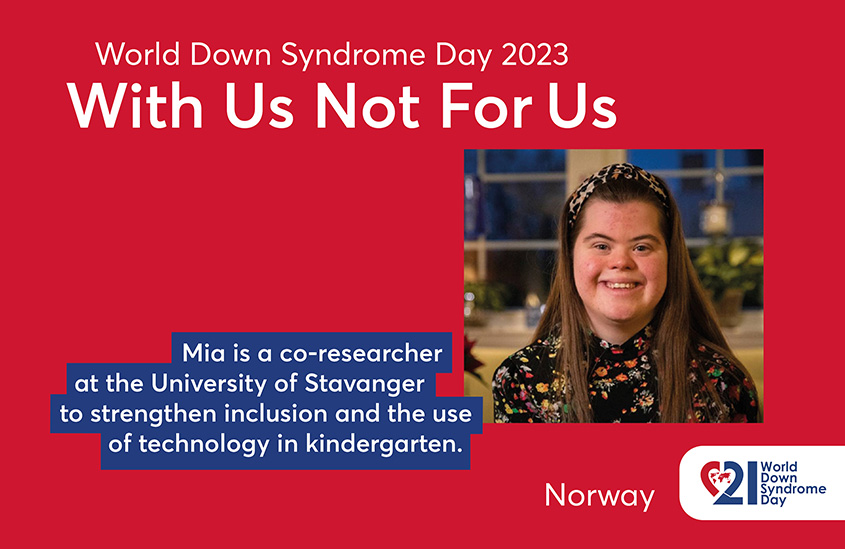Mia is a co-researcher at the University of Stavanger to strengthen inclusion and the use of technology in kindergarten.
The FILIORUM project DiCoTe (Increasing professional Digital Competence in Early Childhood Teacher Education with focus on enriching and supporting children‘s play with coding toys) aims to increase digital competence in Norwegian kindergartens and aims to develop resources that will help kindergarten teachers to enrich and support children‘s play with technology in kindergarten. The aim is to strengthen children‘s learning of important skills such as logical thinking, cooperation, inclusion and emotional and social skills. In order to effectively include children with developmental disabilities, researchers and practitioners need to understand more about their challenges. Inclusive research is then an important element. This means that a researcher with a developmental disability is involved in the research process and influences how research is developed. It helps researchers and practitioners to gain a new insight, and at the same time it helps co-researchers to have increased self-esteem, increased skills, the feeling of being seen and respected, as well as the experience of having something to contribute.
The co-researcher in this project is Mia Johansen and her task is to write short stories that contain all the information to understand how a robot should be programmed (a robot that is programmed without a screen, but with tactile arrows). In this way, the children can build the path for the robot and the kindergarten teacher can see if the children have understood the instructions. Mia is very precise in giving directions and therefore the children work specifically with algorithmic thinking and spatial understanding. Mia contributes with her expertise and knowledge based on her own experience with learning. She is fantastically good at connecting her own knowledge to reality, and that is incredibly important in relation to how children learn mathematics. Through her stories, Mia helps the researchers and the kindergarten teachers to identify themselves with the robot, observe the individual details, give precise instructions about how the robot moves, as well as define a situation in a detailed way. This helps to strengthen and facilitate the learning of algorithmic thinking and spatial understanding. Now the next task is to work on how to support children‘s understanding of mathematics when they struggle with numbers, but they have other mathematical skills, such as spatial understanding. The literature shows that children with Down‘s syndrome often have this problem, and therefore have difficulties in learning mathematics. With her personal point of view, Mia wants to help researchers to understand how it is possible to present mathematics in a way that can include all children, regardless of their level of development.
Mia er medforsker ved Universitetet i Stavanger for å styrke inkludering og teknologibruk i barnehagen.
FILIORUM-prosjektet DiCoTe (Increasing professional Digital Competence in Early Childhood Teacher Education with focus on enriching and supporting children’s play with coding toys) skal øke den digitale kompetansen i norske barnehager og har som mål å utvikle ressurser som skal hjelpe barnehagelærere å berike og støtte barns lek med teknologi i barnehagen. Målet er å styrke barns læring av viktige ferdigheter som logisk tenking, samarbeid, inkludering og emosjonelle og sosiale ferdigheter. For å kunne inkludere barn med utviklingshemming effektivt trenger forskere og praksis felte å forstå mer om deres utfordringer. Så er inkluderende forskning et viktig element. Det betyr at en forsker med utviklingshemming er involvert i forskningsprosess og påvirker hvordan forskning utvikles. Det hjelper forskere til å få en ny innsikt, og medforsker til å ha økt selvfølelse, økte ferdigheter, følelsen av å bli sett og respektert, samt opplevelse av å ha noe å bidra med.
Medforsker heter Mia Johansen og sin oppgave er å skrive korte fortellinger som inneholder all informasjon for å forstå hvordan en robot skal programmeres (en robot som programmeres uten skjerm, men med taktil piler). På denne måten kan barna bygge veien for roboten og barnehagelæreren kan se om barna har forstått instruksjonene. Mia er veldig presis på å gi veibeskrivelse og derfor jobber barna spesifikt med algoritmisk tenkning og romforståelse. Mia bidrar med sin kompetanse og kunnskap basert på egne erfaring med læring. Hun er fantastisk flink til å koble egen kunnskap til realiteten, og det er utrolig viktig i forhold til hvordan barn lærer matematikk. Gjennom sine fortellinger hjelper Mia de forskerne og de barnehagelærerne til å identifisere seg selv med roboten, observere de enkelte detaljene, å gi nøyaktige instruksjoner om hvordan roboten beveger seg, samt definere en situasjon på en detaljert måte. Dette bidrar til å styrke og lette læringen av algoritmisk tenkning og romforståelse. Nå er neste oppgave å jobbe om hvordan å støtte barns forståelse av matematikk når de sliter med tallene, men de har andre matematisk kompetanse, som for eksempel romforståelse. Litteraturen viser hvordan barn med Downs syndrom ofte har dette problemet, og derfor har vanskeligheter med å lære matematikk. Mia vil med sitt personlige ståsted hjelpe forskere til å forstå hvordan det er mulig å presentere matematikk på en måte som kan inkludere alle barn, uavhengig av deres utviklingsnivå.

